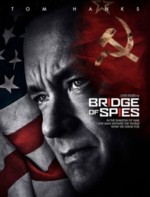In 1960 the Russians shot down an American U-2 spy plane that was overflying and photographing their military bases. The U-2 Incident was big news when I was in High School and I remember it quite clearly.
The Incident forms the background to Bridge of Spies a 2015 movie, directed by Steven Spielberg and starring Tom Hanks and Mark Rylance from a screenplay written by Matt Charman together with Ethan and Joel Coen that centres on these true events.
Spielberg and the Cohen Brothers. Who could miss it?

An International Incident
Although just one flight became an international sensation, secret papers (now in the public domain - link) reveal that this was one of many such flights and this was the eleventh US spy plane that the USSR had shot down.
So why this time?
This was the first time the Russians got 'bankable evidence' of the US incursions, because pilots had instructions to trigger a 'destruct device' to blow up secret parts of their plane and if by chance they survived they carried shellfish toxin, hidden in a coin, to ensure that they weren't captured alive.
Thus the Americans routinely denied that these were spy planes engaged in identifying Soviet nuclear weapon sites for targeting by the US missiles but rather highflying weather research aircraft blown off course.
So they released a note with the usual excuse:
| As already announced on May 3, a United States National Aeronautical Space Agency unarmed weather research plane based at Adana, Turkey, and piloted by a civilian American has been missing since May 1. The name of the American civilian pilot is Francis Gary Powers, born on August 17, 1929, at Jenkins, Kentucky. In the light of the above the United States Government requests the Soviet Government to provide it with full facts of the Soviet investigation of this incident and to inform it of the fate of the pilot. United States Note to the U.S.S.R, May 5, 1960. |
This deceit was repeated by President Eisenhower directly to Soviet Chairman Nikita Khrushchev immediately before important diplomatic talks at the Paris 'Four Powers Summit'. The four powers were the previous allies against Germany: the US, Britain, France and the USSR.
Khrushchev deliberately let the Americans think that like the earlier flights Powers had obeyed orders. So incriminating evidence on his plane must be securely destroyed and Powers must be dead. The American cover-up continued while the Russians disingenuously demanded to know more with headline catching suspicion.
The problem was that the Russians had all the facts right from the start. Not only had the explosive evidence-destroying charges in his plane not been detonated but Powers was very much alive and telling all about the spy program.
In addition to Powers the Russians had the high resolution cameras that were supposed to have been blown to smithereens, complete with incriminating photos of Russian military facilities deep inside the USSR.
|
...This and other information revealed in speeches of the head of the Soviet Government completely refuted the U.S. State Department's concocted and hurriedly fabricated version, released May 5 in the official announcement for the press, to the effect that the aircraft was allegedly carrying out meteorological observations in the upper strata of the atmosphere along the Turkish-Soviet border. Part of the U.S.S.R Note to the United States, May 10, 1960 |
Powers was paraded before the international press, along with the plane and it's damning evidence, before being convicted of spying and sentenced to 10 years in jail.
The US press condemned Powers as a traitor for not destroying his plane and for allowing himself to be interrogated. I recall schoolboy discussions debating this in Australia.
It has been speculated that Khrushchev had been looking for an excuse to sabotage the Four Powers Summit. Certainly all good will was lost and the Paris meeting collapsed.
